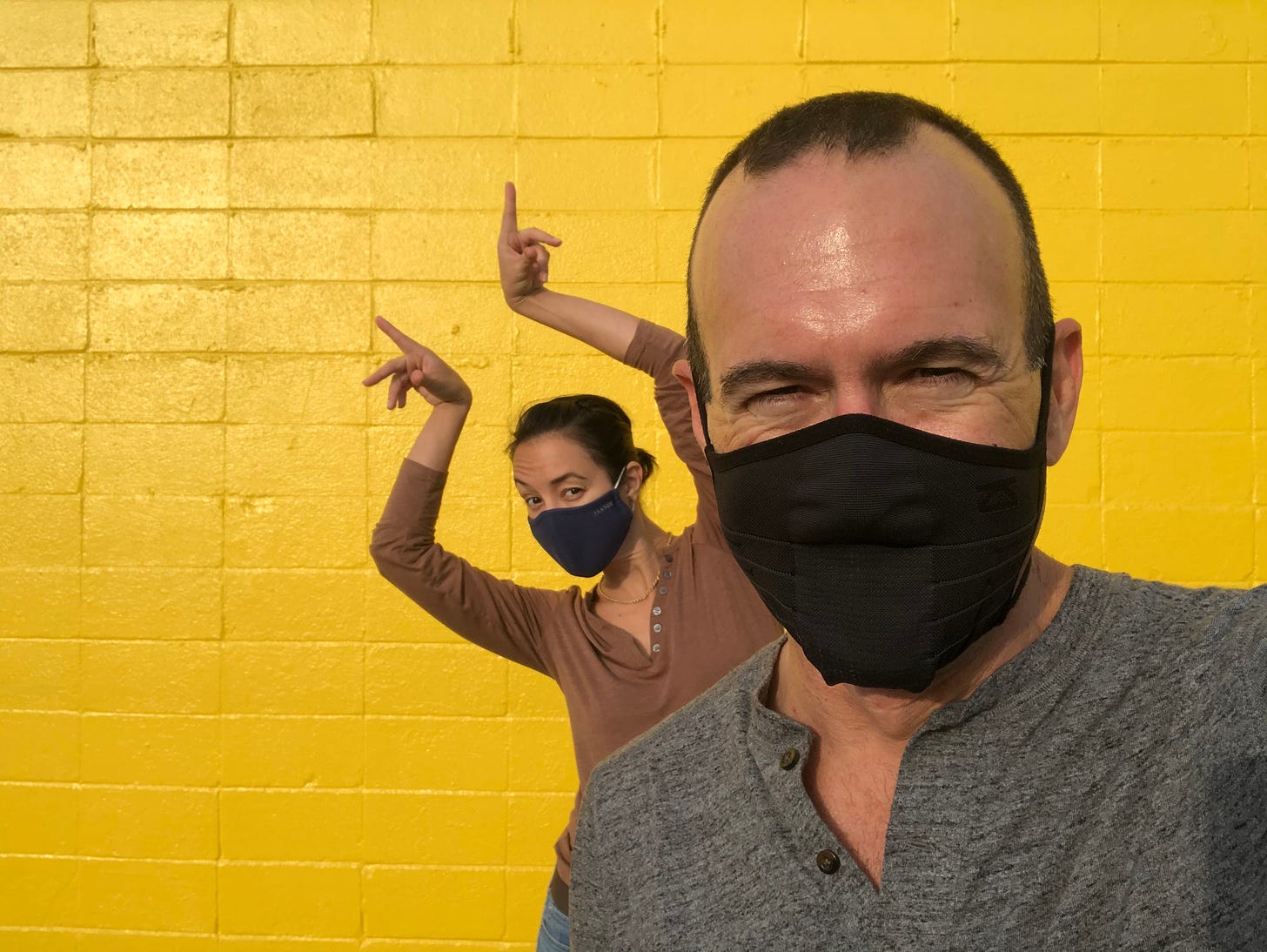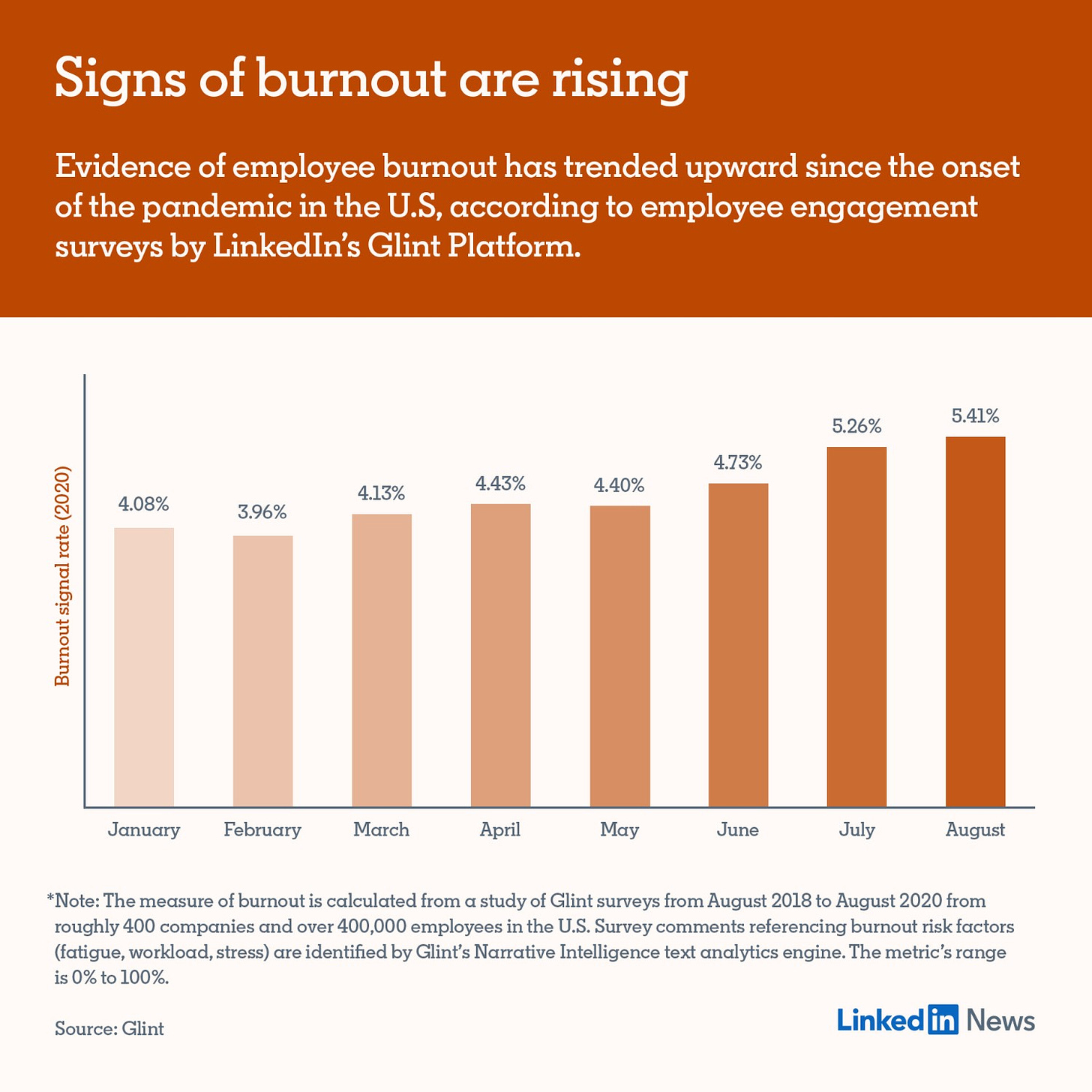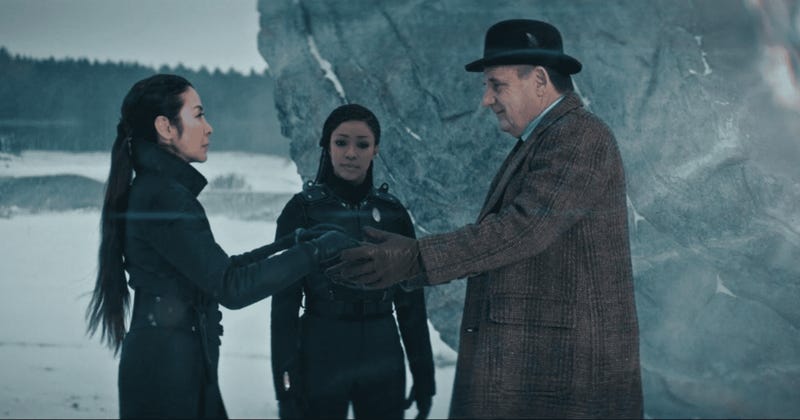Welcome to The Experiment, where we are “Baby, It's Cold Outside” originalists. But Christmas is so yesterday. We’ve got a week left to take advantage of the End of the World sales. Have you made a plan for the apocalypse yet?
This week is an especially immediate newsletter with a firm grasp of the moment. Sarah E. Moss, making her debut in The Experiment, maps the intersection of time and music in “It’s Rock and ‘Rona Time.” David McLemore returns to offer a new year’s resolution based on the last piece of advice he got from his late wife in “Look for Patterns.” Rachel Megan Barker checks in from Great Britain with a conventional new year’s resolution — with a twist — in “Sleep.” And Sonia Van Meter is finding the perfect metaphor for 2020 in her latest recap of Star Trek: Discovery in “‘You can’t just live in doorways.’”
And as always, we remember who we lost and offer recommendations on what to do (making recipes left behind by COVID victims), read (Robert Draper’s book on the Iraq War), watch (Ethan Hawke in “The Good Lord Bird”), and listen to (Benny Sings).
But first, did I ever tell you my secret for keeping new year’s resolutions?
Let’s talk about my secret for keeping new year’s resolutions. People who tell you it’s about creating habits rather than achieving goals… I mean, if that worked, Americans would be a skinny, well-read bunch of moderate drinkers who never smoke. Meanwhile, here on Earth people run into brick walls with their eyes closed every January and wonder why they wake up in February with scrapes all over their face. The secret to keeping new year’s resolutions, I’ve found, is making the right ones. Let me share the resolutions I made — and kept — in 2020 to show you how it’s done.
I resolve to maintain my decades-long unbroken streak of not going to a discotech in Cleveland in February with any member of the Bush family.
I resolve not to root for the New York Yankees, which is much easier than it may appear.
For that matter I resolve not to play for the New York Yankees.
I resolve not to vote for Donald Trump. Done! Many times, in fact, early and often.
I will not drop it like it’s hot unless it actually is hot.
I resolve never once to write with my feet nor to read with my eyes closed.
I resolve to wear pants at least some of the time, if not often.
Achieving such unvarnished success is easy, I tell you. Oh, who am I kidding. My success is highly varnished, several layers sanded and buffed to a high gloss. So proud was I of my system — and if you choose to call it The Stanford Method, who am I to argue, really? — that I recently let my wife in on the secret, which is when I learned that I have been doing everything wrong all along.
Apparently these resolutions are exercises in self-improvement. Unfamiliar with the concept, I asked other contributors to The Experiment to show me some examples to get me pointed in the right direction.
Kate Dawson, who wrote back in July about the unexpectedly happy upside of having her book tour cancelled because of the pandemic, ended up achieving a huge success with her historical true crime podcast Tenfold More Wicked. Surprisingly, it’s more of the former than the latter for her new year’s resolution.
“My resolution is to constantly remind myself of how this pandemic has affected me positively, to avoid the negative. I’d had more family time, more creative time (no commuting) and more appreciation for life,” she writes.
Stefan Hankin, who often wrote about the centrist path out of this mess, doesn’t really do resolutions, but he’s taking the lessons learned in 2020 into the new year. For him that means having lunch with his kids every day, traveling more, and “cooking more interesting things or do take out with friends,” he writes. “Yes I am looking forward to being able to eat out again, but the ability to sit in a backyard with a few friends is so much easier to coordinate than a dinner out (especially since most of my friends have kids). Lets do this more.”
Two-time cancer survivor Loriana Hernandez-Aldama, who offered lessons last May in how to stay alive, offers a taxonomy for her new year’s resolution: prepare, present, and prevail. She even made you all a cute video.
“I want to write more,” offers Josh Berthume, whose hugely influential “7 Hours in November” sounded the alarm back in June that slow election returns created space for mayhem. I give Josh’s piece some credit for the mainstream press and political establishment not getting caught flat-footed when Donald Trump attempted shenanigans. Yes indeed, I do hope Josh writes more.
Nathan Ryan, who wrote a nice piece in September about his time as the drummer in the contemporary Christian version of Coldplay, has been “doing well—in pandemic adjusted terms.”
“I haven't had as much time as I'd like to sort through every experience or feeling from 2020 as I sprinted towards the finish line. Unpacking this year might take a few years” he writes. “But I do know that, going into 2020, I'm going to continue to learn how to listen more effectively to people, how to advocate and partner more effectively with people, and how to forgive and show grace more effectively—even as I continue to fight hard for the things I believe in.”


Anyone who makes it through 2020 with their health and career intact should count themselves among the luckiest people in the world. But there have been deprivations of consequence. My oldest son’s college experience now takes place inside an apartment in College Station, a sentence historians will record as one of the saddest ever written in the English language. My youngest, the high school senior, attends school in his bedroom. My youngest brother’s wedding in Australia is being postponed until large family gatherings carry with them only the threat of wanting to die. In video meetings, I can see the eyes of my colleagues as everyone is Doing. The. Best. They. Can. If mental health were dog years, how much have we aged in 2020?
I’m at the end of this year in more ways than one, exhausted in an impressive array of varieties. I know why I’m tired. I was there the whole time. Even from my incredibly privileged position, there were terrors and stresses. It’s like we were all wearing weighted vests as we made our way through 2020. “Why am I so tired?” my wife keeps asking. I gesture vaguely at the window. “Oh yeah,” she says. I’m so tired I catch myself looking at floors as possible nap locales.
I listened to a great TED Talks Daily podcast in which a social scientist talked about the rising tide of burnout among those working from home on endless loops of video meetings. She ticked off the signs of burnout: fatigue, cynicism, and feeling overwhelmed, and in my head I thought, Yep, check, check, check. I know I’m not alone. The numbers of workers saying they are showing signs of burnout has gone up by a third, and those are just the self-reporting ones.
This year made our worlds small. So in 2021 I’m going to do something big. This is so ambitious I’m afraid to type the words lest I incur some mythical wrath, though after everything in 2020 I think we’re fresh out of krakens. In 2021, it should be safe at some point to go outside and explore this world, so I’m going to do something I’ve never done before. In 2021, I’m going to take all my vacation time, which people now call paid time off, or PTO.
I’ve never taken all my vacation time. Not even once. Early in my career I was self-employed, and every day off dug the hole a little deeper, making it that much harder to keep the doors open. I mostly traveled to visit family over holidays and family gatherings. Entire years would pass without me going anywhere for fun, and I became accustomed to not having much fun at all anywhere.
PTO has only been a part of my life since 2014. Every year, I’ve been given four weeks. All I had to do was take it, and yet I never did.
Mind you, this came on top of holidays, the weeks over Christmas and New Year’s Day, and the filler days that fell between weekends and major holidays, turning an Independence Day on a Thursday into the beginning of a glorious, four-day weekend. So I’ve had some breaks, and I remember lots of trips (as well as vacations spent working on a book). But by my rough calculations I left at least a month and a half on the table in the last five years. Where would I have gone? What books would I have read?
In 2020, my status quo of stasis was forced upon all of us. We did not see my brother get married in Australia. My annual writing retreat with Frank did not happen. We did not visit the in-laws for Thanksgiving or drive to Guadalajara for Christmas. Hell, I haven’t sat at a table in a restaurant with my wife since March. People, you can have Paris and Rome. My favorite vacation spot is a table in a nice restaurant sitting across from Sonia Van Meter. We’ve been home so much this year our couch is asking to see other people.
“I wasted time,” Richard II says in prison, “and now doth time waste me.”
That ends in 2021. No more will I leave time off to the chance that I can claim what’s left over after the chores of commerce. I’m going to request all my PTO before the month of January is out. I’m going to plan 2021 around my vacations and not fit them into the spaces left after work. As long as I have a job, work will always consume time that isn’t blocked off.
“Even though you seize the day,” wrote Seneca, “it still will flee; therefore, you must vie with time’s swiftness in the speed of using it, and, as from a torrent that rushes by and will not always flow, you must drink quickly.”
Oh, the places I’ll go! I’ll take my first sip in January and rent the nicest hotel room in all of College Station where my sons and I will celebrate my oldest’s birthday by watching movies and ordering pizza. We’re already imagining other trips — to see an Eagles game, to find another park to explore, to take the whole family to Australia to marry off my youngest brother, to spend our anniversary week in Miami Beach again. I’m reading that list of adventures and realize that I’m going to have to up my game, because that only takes a little over half my PTO. Maybe Frank and I will plan another writing retreat. Maybe I’ll tag along with Bryan as he does some book research in New Mexico.
Maybe I’ll take time off to do nothing at all. I might read a book by a pool. I might eat a sandwich and just think about nothing at all, dipping my cup into the stream of time and taking a big drink. Did you know time is the most-used noun in the English language? We think of time as a renewable resource but talk about it as a commodity to be spent, saved, and wasted. The one thing you can’t do is to stop time. Even in 2020, when everything seemed to stop before accelerating horribly, time moved forward second by second, minute by minute until it claimed millions of jobs, hundreds of thousands of lives, a presidency, and the last bit of energy I had to give. As my friend Ryan likes to point out, time is undefeated in the history of the world. Mick Jagger lied to us. Time is most definitely not on our side.
All we can do to mitigate time’s inexorable march is to take some of it for ourselves. In 2021, I resolve to take the full measure allotted to me.
It’s Rock and ‘Rona Time
by Sarah Wolf
“Time insists on its milestones even in a pandemic,” writes political organizer Sarah E. Moss, making her debut in The Experiment here to explain why she did her hair for the second time during the pandemic and how she’s finding harmony with others even in isolation. Now, if her cat will just shut up so she can get a clean take.
Look for Patterns
by David McLemore
After a year in which he stared at walls more than usual, David McLemore resolves to do more of the same, in a way. It’s one of the last instructions he got from his late wife; in 2021, David is going to look for the patterns.
Sleep
by Rachel Megan Barker
The self-described Rachel Megan Barker checks in from England with a pretty typical new year’s resolution: get more sleep. The problem, though, isn’t that she wants more sleep. She’d rather be awake. Always has. Therein lies her challenge.
S3 E10: “You can’t just live in doorways”
by Sonia Van Meter
This is the perfect episode to end the year on. Sonia Van Meter finds the passageway in Star Trek: Discovery that leads us from the Before Times to whatever is next. Because the last thing we can do is stay there. The Uncertain Now is not a place to stay. This year is a door, and what do you do with doors? You pass through them.
We have merch
We’ve got a merch table in the back where you can get T-shirts, coffee mugs, and even tote bags now. I’ll be there after the show. Come on by and say hi.
Who we’ve lost
This United passenger
These eight nuns in Wisconsin
These five journalists
This country singer
How we’re getting through this
Getting hit in the dad feels
Deregulating French Dressing
Making Olive Garden’s pasta al fagioli
Making the holiday recipes of COVID victims
Not believing in trickle-down economics ever again
Drinking cold brew cocktails on Christmas morning
What I’m reading
John Allsop: “The enduring lessons of a New Deal writers project” - A publicly funded program to pay out-of-work writers to tell the stories of a divided country? Sounds good to me.
It was, by turns, a literary, anthropological, and sociological experiment. It was also radically journalistic—an exercise in sending reporters out into a misunderstood country and capturing the stories of people whose voices typically went unheard. The project paid close attention to style but also prized accuracy.
Robert Draper: “To Start a War: How the Bush Administration Took America Into Iraq” - Draper did a good ‘un here. Read this book.
On at least one occasion, Cheney flourished a Red Cell paper… to buttress a point—when, as one of the team members would say, “our goal was plausibility, not anybody’s notion of truth.” …
At the bottom of this slippery slope was what Furedi would term “the enthronement of ignorance,” in which intelligence could be discarded altogether and the American public could be exhorted “to take what we don’t know as seriously as what we do.” …
After the attacks on America, a policymaker could part ways with the CIA’s mainline analysis and lie down in the darkness of what Furedi termed “the catastrophic imagination.” But there was another alternative after 9/11: to ferret through the reams upon reams of raw information now pouring into the intelligence community and thereby find any nightmare scenario conceivable.
Factually: “Will Trump’s example change how politicians handle the truth?” - Is Trump really getting away with all the lying?
As the Trump era comes to a close, a big question for fact-checkers and other journalists covering the next administration is whether his mendacity has diluted the standard of truthfulness that we can expect from American leaders. Will fact-checkers call politicians on their falsehoods only to hear them repeated again and again? Has President Trump normalized lying?
There are reasons to be concerned, but, probably, more reasons to believe that Trump is an aberration.
Rachel Handler: “I Got High and Made Croissants Like Meryl Streep” - h/t to Charlie Bonner for passing this gem along.
Could a layperson make croissants high? Could an actual pastry chef even make croissants high? Or was this a skill bestowed exclusively upon Meryl Streep in It’s Complicated, inadvertently perpetuating a dangerous myth?
James Poniewozik: “Review: ‘Bridgerton’ Is a Sparkly Period Piece With a Difference” - This review was so much fun to read that I want to watch a Shonda Rhimes period drama.
As with the productions of Ryan Murphy, another emigrant from network TV to the gold-paved production lots of streaming, the upgrade in budget and scale is dazzlingly apparent. But certain themes and hallmarks remain.
One is a dedication to sexy, smart popcorn escapism. Another is the belief that characters of color should get to have just as much fun, have just as much agency and range of possibility — and be just as bad — as anyone else.
Poynter: “Behind the scenes with PolitiFact and its choice for ‘Lie of the Year’” - Becoming the “Lie of the Year” for 2020 seems like a massive achievement.
Ultimately, we decided on lies about the coronavirus, though, because health and well-being are at the core of what it means to be human. If you can’t keep yourself and your family safe and healthy, you can’t form a government with your fellow citizens. Life itself comes before democracy.
Roger Reeves: “Doc Rivers and America’s preoccupation with Black failure” - Roger Reeves should be on your must-read list.
Rivers is not an Ali — whom Norman Mailer characterized as “America’s Greatest Ego.” Rivers is a turn away from the 20th century’s obeisance and fetishizing of a certain sort of masculinity, a turn away from the braggart, the maverick, the conqueror, what Mailer called the desire “to declare we are sure of ourselves when we are not.” In other words, a turn away from Ego.
Ernest Lawrence Thayer: “Casey at the Bat” - The last stanza kills me.
Oh, somewhere in this favoured land the sun is shining bright,
The band is playing somewhere, and somewhere hearts are light;
And somewhere men are laughing, and somewhere children shout,
But there is no joy in Mudville—mighty Casey has struck out.
Nitasha Tiku: “Google hired Timnit Gebru to be an outspoken critic of unethical AI. Then she was fired for it.” - The concept of “rapid hindsight” lit up my brain like a Christmas tree.
“It’s being framed as the AI optimists and the people really building the stuff [versus] the rest of us negative Nellies, raining on their parade,” Chowdhury said. “You can’t help but notice, it’s like the boys will make the toys and then the girls will have to clean up.”
William Wan and Brittany Shammas: “Why Americans are numb to the staggering coronavirus death toll” - Smart stuff in here about why our brains are so dumb.
Puzzled by that apathy, a psychologist named Paul Slovic began conducting experiments to better understand people’s reaction to mass suffering and death. What he found was troubling.
In one study, his researchers showed people a picture of a 7-year-old girl dying of starvation and asked for donations to help her. He showed another group two starving children, then even larger sets of children. Slovic found people’s distress didn’t grow with the number of children in danger, but often shrank.
Craig Whitlock: “At War With the Truth” - It is a measure of how much our experiment in self-governance has failed that this report made a temporary impression and did not lead to any changes.
“With the ‘AfPak’ strategy, there was a present under the Christmas tree for everyone. By the time you were finished you had so many priorities and aspirations it was like no strategy at all.”
What I’m watching
If you’re worried that Showtime’s limited series The Good Lord Bird is a white savior myth, don’t. Ethan Hawks plays John Brown as a fool in abolition’s sincere service. It’s comic but not unserious and heightened but not fake. A terrific cast all the way from Charlie Sexton to Killer Mike.
What I’m listening to
Phony Ppl sounds like next-gen Stevie Wonder on “Either Way.”
Rolling Stone said Adia Victoria sounds like "PJ Harvey covering Loretta Lynn at a haunted debutante ball.” Here’s her “South Gotta Change.”
I’m way late to the Ukeme party for the hip-hop persona of Jason Ikpatt, a molecular biology grad student at the University of Texas at Austin. His vibe has a lot of r&b mixed with loifi indie pop. Check out “Softie.”
My rock star cousin George Stanford has a new single out, “Everything All at Once,” with a special assist on cover art from his son Arrow.
Kids, do you like the trip-hop, neo-soul vibe with some inventive dancing in a video? Do you? Because Benny Sings has that for you with a side order of Mac DeMarco.
What do you think of today's email? I'd love to hear your thoughts, questions and feedback. I might even put ‘em in the newsletter if I don’t steal it outright.
Enjoying this newsletter? Forward to a friend! They can sign up here. Unless of course you were forwarded this email, in which case you should…
If your new year’s resolution was to lose weight, try Noom, and you’ll quickly learn how to change your behavior and relationship with food. This app has changed my life. Click on the blue box to get 20% off. Seriously, this works.
Headspace is a meditation app. I’ve used it for a couple years and am absolutely shocked at how much it’s taught me about managing my inner life. Try it free for a couple weeks. Don’t worry if you’ve never done it before. They talk you through it.
I now offer personal career coaching sessions through Need Hop.
We set up a merch table in the back where you can get T-shirts, coffee mugs, and even tote bags now. Show the world that you’re part of The Experiment.
We’ve also got a tip jar, and I promise to waste every cent you give me on having fun, because writing this newsletter for you is some of the most fun I’ve had.
Forget the Alamo: The Rise and Fall of the American Myth by Bryan Burrough, Chris Tomlinson, and myself comes out June 8 from Penguin Random House. There is no better way to support this book than to pre-order a copy. You’re going to love reading what really happened at the Alamo, why the heroic myth was created, and the real story behind the headlines about how we’re all still fighting about it today.













